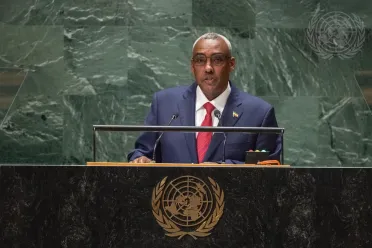Statement
Statement summary
DEMEKE MEKONNEN HASSEN, Deputy Prime Minister and Minister for Foreign Affairs of Ethiopia, said that, in the face of multiple challenges facing the world, the uncomfortable truth is that policy choices are escalating tensions, poverty and hunger are rising, and progress towards achieving the Sustainable Development Goals is off track. Further, climate change continues to have a devastating global impact, with Africa enduring its disproportionate adverse effects, he said, pointing out that the target of mobilizing $100 billion by 2030 to support developing countries’ mitigation and adaptation efforts has not been achieved. The threat of nuclear weapons is also a matter of grave concern, he said, calling for cooperation to ensure that new technologies such as artificial intelligence are used responsibly. He called on States to recommit to the Charter of the United Nations, underlining the need for an inclusive multilateral system. “Maintaining the status quo will not advance our shared interest of ensuring peace and prosperity,” he declared.
Turning to global security, he underlined the need for a system that respects the sovereignty of Member States and prevents conflict, stressing: “Reforming the Security Council is not a choice, but an absolute necessity.” Allocating permanent seats for Africa, as set out in its continental common position, is politically and morally justified. Commending the Secretary-General’s efforts for financing African Union peace support operations through assessed contributions, he underscored that national ownership of security responsibilities is imperative. Voicing his opposition to unilateral coercive measures imposed on developing countries, he called for their unconditional removal. Further, the Addis Ababa Action Agenda should be fully implemented to meet the Sustainable Development Goals, he said, noting that his country has aligned its 10-year development plan to that aim. On the climate crisis, he spotlighted his country’s national “Green Legacy Initiative” to ensure development through rural and urban green programmes.
On the domestic security front, he spotlighted the Pretoria Peace Agreement — which ended a two-year conflict in northern Ethiopia — as “a practical embodiment of ‘African solutions to African problems’”. Its continued successful implementation, despite some delays in carrying out the disarmament, demobilization and reintegration process, demonstrates the Ethiopian Government’s commitment to resolving political differences through dialogue and constitutional means, he noted. Moreover, Ethiopia is finalizing its transitional justice policy to ensure accountability and is initiating inclusive dialogue through the National Dialogue Commission to address past and present concerns.
Turning to regional peace and security concerns, he called for a regional approach to addressing conflict-induced crises in the Horn of Africa. On the difficult situation facing Sudan, to which Ethiopia has extended support, while respecting that country’s sovereignty and territorial integrity, he underscored the need to ensure all peace initiatives are coordinated. He also called for regional cooperation to address legitimate development aspirations, such as the completion of the Grand Ethiopian Renaissance Dam. To this end, he welcomed the resumption of trilateral talks with Egypt and Sudan. More broadly, he underscored the need to mobilize resources to help Africa implement its Agenda 2063. To this end, he called for the reform of the international financial architecture with special consideration of the continent’s needs and priorities, underscoring the need for a fast-tracked resolution of Africa’s debt crisis and the provision of additional development finance.
Demeke Mekonnen Hassen, Deputy Prime Minister of Ethiopia, asked world leaders: “Do we have the necessary political will to choose global partnership over geopolitical competition [and] are we prepared to work together towards a promising age of shared prosperity?” The uncomfortable truth, he said, is that policy choices are escalating tensions, poverty and hunger are rising, and progress towards achieving the SDGs is off track.
Full statement
Read the full statement, in PDF format.
Photo

Previous sessions
Access the statements from previous sessions.
